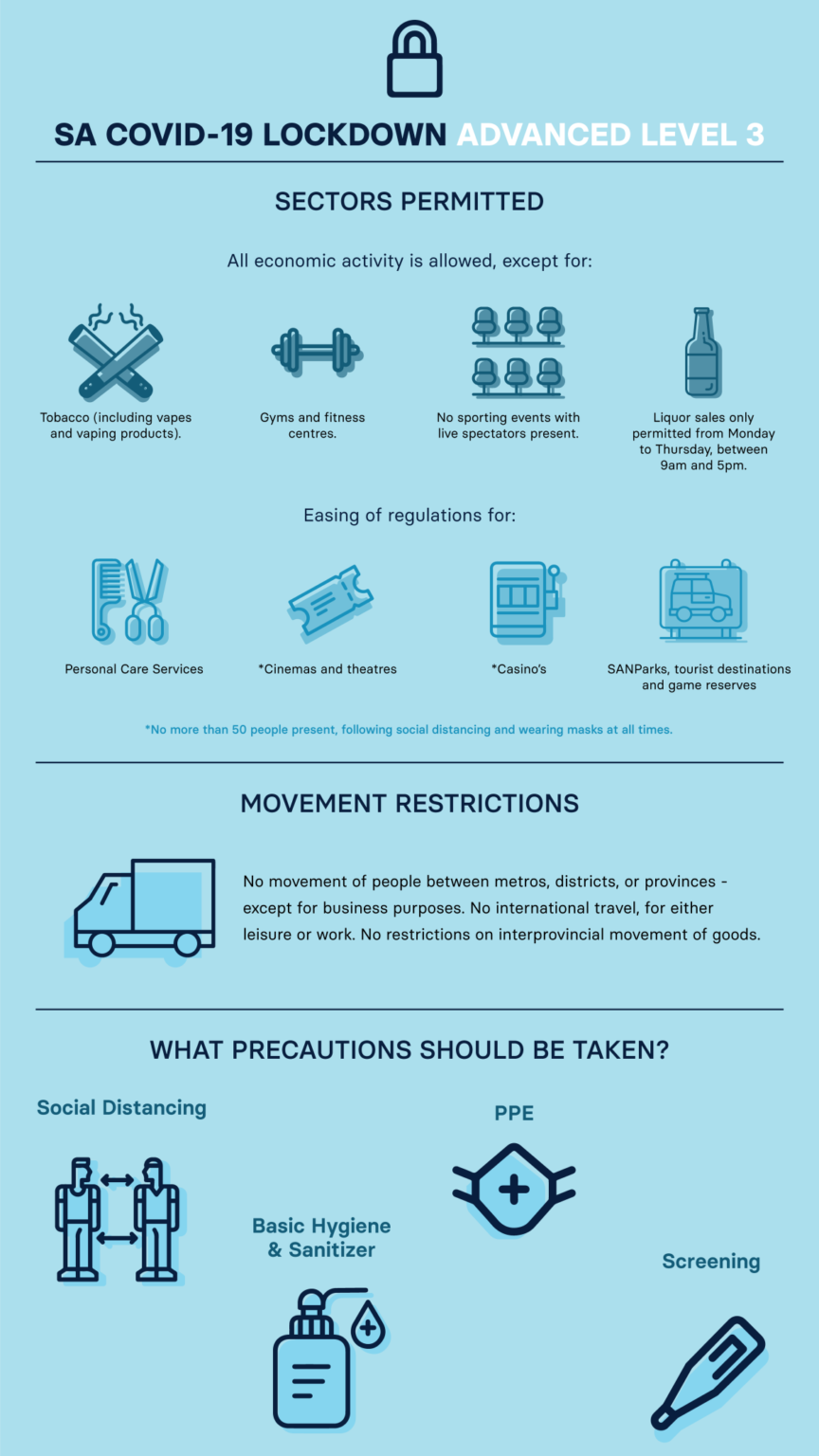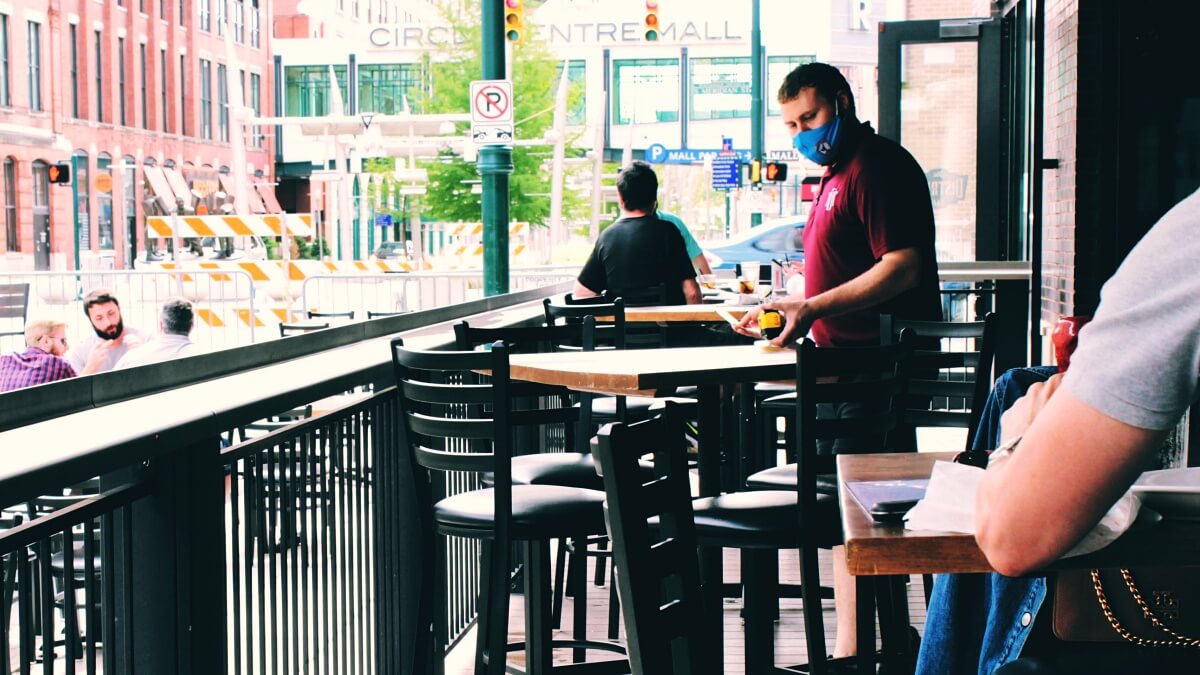Level 3 amendments: Booze ban and curfew back, masks are mandatory
As of 12 July 2020, during the Presidential address, there were some key changes to Level 3 lockdown regulations.
The alcohol ban is reinstated nationwide. The sale of alcohol on any platform (retail or online) is prohibited. Effective immediately.
An evening curfew for travel is now back between 9pm and 4am, effective from 13 July 2020.
The wearing of masks is now legally required. In his address, President Cyril Ramaphosa said that business owners, and those in charge of transport facilities and other public places are legally obliged to enforce mask wearing.
Lockdown Level 3 advanced
The regulations surrounding Level 3 were advanced to include more economic activity, however these are subject to change. Keep an eye on this blog post for further updates pertaining to specific industries.
The information below was correct at the time of publishing and is updated as regularly as possible. It is best to check regulations with the official relevant department if you are unsure.
Who may trade during Level 3 of the lockdown?

South Africa has moved to advanced level 3 of lockdown, ostensibly because the government is fast running out of relief funds, and desperately needs to revive the economy to save livelihoods. The latest discovery of a breakthrough COVID treatment has also eased some of the collective panic around opening up for business.
On a personal note, we are still not allowed to gather for social reasons but curfew has been lifted and evictions are still prohibited. Public exercise is now allowed from 6am to 6pm, and may be in groups of up to four people. Beaches remain closed but parks (not all of them so check with your local authorities first) are open for exercise. No social gatherings are permitted in these public spaces.
School are staggered to reopen for all grades by August, with adjusted school terms for 2021, and universities may operate at 33% capacity.
Sectors permitted
All economic activity is allowed, except for:
- Tobacco (including vapes and vaping products),
- Gyms and fitness centres,
- No sporting events with live spectators present.
- Liquor sales are only permitted from Monday to Thursday, between 9am and 5pm.
Easing of regulations:
1. Personal Care Services allowed: (from Friday 19 June)
- Hairdressing & Barbering
- Nail and toe treatment
- Facial treatment and make-up
- Body massage
- Tattooing and piercings
2. Restaurants, street food vendors and informal eateries for sit-down meals (delivery & collection still allowed as per usual)
- Sale of alcohol for on-site consumption is still prohibited
3. Only accommodation for business or work purposes is permitted
- No use of home-sharing like AirBnb
4. Conferences and business meetings
- No more than 50 people present, following social distancing and wearing masks at all times.
5. Museums, cinemas and theatres
- No more than 50 people present, following social distancing and wearing masks at all times.
6. Casinos
- No more than 50% capacity, following social distancing and wearing masks
7. Non-contact sports (golf, cricket, tennis and others)
8. Contact sport training only
- Modified activities and restricted facilities (details to be announced)
9. Funerals & Religious gatherings
- No more than 50 people present, following social distancing and wearing masks
10. SANParks, tourist destinations and game reserves
- Only for self-drive excursions
Transport restrictions
All public and private forms of transport are allowed, subject to directions.
Movement restrictions
No movement of people between metros, districts, or provinces – except for business purposes, commuting to educational institutions, attending a funeral, caring for a loved one, or receiving medical treatment. No international travel, for either leisure or work. No restrictions on interprovincial movement of goods.
What precautions should be taken?
All workplaces:
Social distancing:
Maintain 1.5m between staff and customers; demarcate safe spacing where possible; install physical barriers where 1.5m separation is not possible (subject to specific sectoral regulations).
Basic Hygiene & Sanitizer:
Businesses must make provision for regular hand washing/ sanitizing stations, and regularly sanitize all surfaces, paying close attention to high-touch zones.
PPE:
All businesses must supply regulation face masks for employees (and ensure their proper laundering or disposal), plus any other protective gear as required by their industry recommendations (like visors, aprons or gloves).
Screening:
Employee screening is mandatory, and safe protocols for assisting those at risk must be established. Here’s a helpful video to help monitor for symptoms.
Industry specific precautions for Level 3
Due to the expanse of economic activity under Level 3, it is important for business owners to consider their unique industries and circumstances when taking precautions to protect staff and customers. While the official precautions for each industry are still being gazetted, small business owners are encouraged to be proactive in their measures.
Restaurants
Restaurateurs throughout the country are celebrating the reopening of sit-in dining from the 29th of June. Preparations have been underway, as many chose to prepare for some likely requirements in advance, based on international guidelines. The regulations stipulate stringent sanitizing protocols for guests and staff, 1.5m between customers whether seated or queuing, and menus should be digital/online, or be replaced (and sanitized) between diners.
Personal Care Services
Social distancing: If 1.5m cannot be created between stations, physical clear barriers or partitions must be installed. No scalp, neck, shoulder, or arm massages allowed at the basin for hairdressers, no unnecessary touching in general, no food or beverage amenities, and no guests (only the client being serviced). Minimize the time spent interacting with customers where possible. Restricting walk-ins is highly recommended.
PPE: Full face-protection gear must be provided for close face-to-face contact, and must be sanitized between customers. Aprons must be changed (and laundered) between serving each client. Tattoo parlours must use nitrile gloves, not latex.
Hygiene: Particular care must be taken with cleaning and sanitizing basins between each use, as well as enforcing a full deep clean of the premises at the beginning and end of each day. Each station must be thoroughly disinfected between clients, making sure to sanitize all bottles, products, equipment and surfaces. Find all the detailed instructions in the full gazette here.
Hotels and Accommodation
Many in the hospitality industry celebrated when the president announced that accommodation for leisure would be reopened. Hoteliers have been preparing for restrictions on capacity, mandatory time between room occupancies to allow for proper decontamination, and the minimization of decor. However, the latest gazette retracted that promise and has reinstated the restriction on accommodation – only for business. In the meantime, in order to protect business travellers, strict social distancing and hygiene will be enforced, and lifts, pools and any special facilities or common recreation areas will be carefully limited.
Casinos
The regulations limit capacity to 50%, and strict adherence to social distancing and proper hygiene. Industry leaders have been eagerly preparing for some time: chips will have a rigorous sanitizing regimen; only every second seat at slot machines and betting tables will be open for use; clear barriers will be erected in areas where proper social distancing is problematic; and strict health screening systems (before entry) will be put in place.
Cinemas and Theatres
This is yet another group of businesses that have been waiting for gazetted details, and large theatre groups have braced themselves for fewer screenings/shows per day, staggering and screening customer entry, limiting capacity, only allowing tickets to be purchased in advance online, and implementing intensive sanitizing procedures for a plethora of high-touch spots in their environment (from door handles, to ticket counters and arm rests).
Public Transport
All forms of public transport must remain at 50% capacity, except minibus taxis undertaking long trips who must adhere to a 70% occupancy. Local trips may increase capacity to 100% on condition that new protocols related to masks, vehicle sanitation and open windows are followed. (Strict sanitizing in between trips with all passengers wearing face masks at all times.) The Metrorail will be reopening on 1 July.
Is your business reopening under the advanced Level 3 regulations?
Connect with us in the comments below with any questions or concerns you might have, and we will update the blog with relevant information as it is published by the relevant government department.



